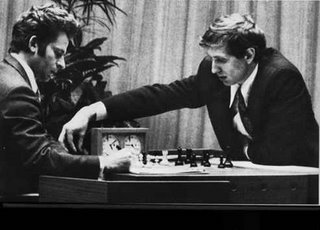Brooklyn Boy Fights Cold War on Chess Board!

During the Summer of 1972 it seemed like every New Yorker was caught up in
the fervor surrounding local boy Bobby Fischer's battle to win the world
chess championship from the Russians, who had held it since World War
II. The best-of-24-games match, which was held in Iceland, was not only a
metaphor for the Cold War, but also resulted in a huge interest in in chess
amongst the public. It was like a Subway Series, the Olympics and the
Ali/Frazier fight, all rolled into one.
Chicago native Bobby Fischer became a chess prodigy after moving to NYC,
where he attended the prestigious Erasmus Hall High School in Flatbush, and
by 1972 he was ready to take on Boris Spassky, Russia's best. To understand
the competition in its context, it helps to remember that chess is not a
game in Russia; it is, as P. J. O'Rourke pointed out, a spectator sport.
And the Soviet Union's leadership made certain that only winners went on
to represent their nation on the worldwide circuit, thereby proving the
intellectual superiority of their ideology. Consequently, this was going to
be more than just a chess match.
Alas, Fischer turned out to be no nice Jewish boy from Brooklyn. At the
last minute he refused to travel to Iceland until the promoters put up
substantially more money for the tournament. Something of a recluse, he
would he heard in his hotel room rehearsing moves, yelling things like
"Pow!" when he captured a piece, and he would insist upon having the
swimming pool all to himself. But the public was willing to forgive Bobby
(at least at the time) for the sake of Old Glory. The media was caught up
in the excitement, and you could watch live coverage of the tournament on
television, including expert commentary. Since quite a few minutes could
often pass between moves, such programming was not exactly fast-paced. You
could also catch up on the day's developments on the evening news, and the
papers would list every move.
Sales of chess sets in many strange styles boomed. There was one set which
glowed under "black" light, and another in which the pieces were made from
nuts and bolts. It seemed as if everyone was playing, and you could see
games everywhere: on stoops, atop milk crates and in pizzerias. It was
really a grassroots movement.
Spassky resigned the tournament on 9/1/72, and Fischer came home an
American Hero. He wrote books on chess and remained active in the sport for
years, as did his opponent. With time, however, the Erasmus alumnus showed
himself to be even wackier than we had thought.

0 Comments:
Post a Comment
Subscribe to Post Comments [Atom]
<< Home